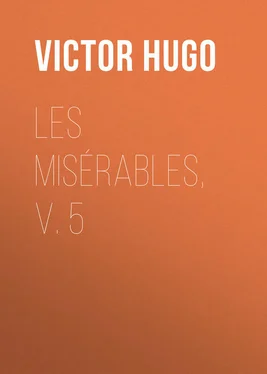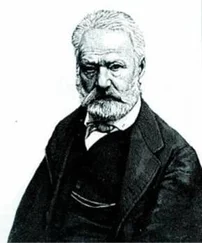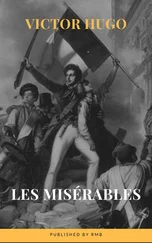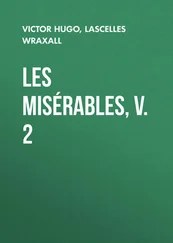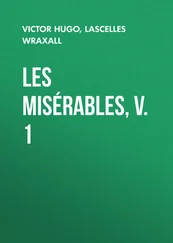Victor Hugo - Les Misérables, v. 5
Здесь есть возможность читать онлайн «Victor Hugo - Les Misérables, v. 5» — ознакомительный отрывок электронной книги совершенно бесплатно, а после прочтения отрывка купить полную версию. В некоторых случаях можно слушать аудио, скачать через торрент в формате fb2 и присутствует краткое содержание. Жанр: literature_19, foreign_antique, foreign_prose, на английском языке. Описание произведения, (предисловие) а так же отзывы посетителей доступны на портале библиотеки ЛибКат.
- Название:Les Misérables, v. 5
- Автор:
- Жанр:
- Год:неизвестен
- ISBN:нет данных
- Рейтинг книги:3 / 5. Голосов: 1
-
Избранное:Добавить в избранное
- Отзывы:
-
Ваша оценка:
- 60
- 1
- 2
- 3
- 4
- 5
Les Misérables, v. 5: краткое содержание, описание и аннотация
Предлагаем к чтению аннотацию, описание, краткое содержание или предисловие (зависит от того, что написал сам автор книги «Les Misérables, v. 5»). Если вы не нашли необходимую информацию о книге — напишите в комментариях, мы постараемся отыскать её.
Les Misérables, v. 5 — читать онлайн ознакомительный отрывок
Ниже представлен текст книги, разбитый по страницам. Система сохранения места последней прочитанной страницы, позволяет с удобством читать онлайн бесплатно книгу «Les Misérables, v. 5», без необходимости каждый раз заново искать на чём Вы остановились. Поставьте закладку, и сможете в любой момент перейти на страницу, на которой закончили чтение.
Интервал:
Закладка:
These four words, carved in the stone with a nail, could still be read on this wall in 1848. The three women took advantage of the respite to disappear entirely, which allowed the insurgents to breathe more at their ease; and they contrived to find refuge in some neighboring house. Most of the wounded could and would still fight. There were, on a pile of mattresses and trusses of straw laid in the kitchen converted into an infirmary, five men seriously wounded, of whom two were Municipal Guards; the wounds of the latter were dressed first. No one remained in the ground-floor room save Mabœuf under his black cere-cloth, and Javert fastened to the post.
"This is the charnel-house," said Enjolras.
In the interior of this room, which was scarce lighted by a solitary candle, the mortuary table at the end being behind the post like a horizontal bar, a sort of large vague cross resulted from Javert standing and Mabœuf lying down. Although the pole of the omnibus was mutilated by the bullets, sufficient remained for a flag to be attached to it. Enjolras, who possessed that quality of a chief of always doing what he said, fastened to it the bullet-pierced and blood-stained coat of the killed old man. No meal was possible, for there was neither bread nor meat. The fifty men during the sixteen hours they had stood at the barricade speedily exhausted the scanty provisions of the inn. At a given moment every barricade that holds out becomes the raft of the Méduse , and the combatants must resign themselves to hunger. They had reached the early hours of that Spartan day, June 6, when at the barricade of St. Merry, Jeanne, surrounded by insurgents who cried for bread, answered, "What for? It is three o'clock; at four we shall be dead." As they could no longer eat, Enjolras prohibited drinking; he put the wine under an interdict, and served out the spirits. Some fifteen full bottles, hermetically sealed, were found in the cellar, which Enjolras and Combeferre examined. Combeferre on coming up again said, "It belongs to Father Hucheloup's stock at the time when he was a grocer." "It must be real wine," Bossuet observed; "it is lucky that Grantaire is asleep, for if he were up, we should have a difficulty in saving those bottles." Enjolras, in spite of the murmurs, put his veto on the fifteen bottles, and in order that no one might touch them, and that they should be to some extent sacred, he had placed them under the table on which Father Mabœuf lay.
At about two in the morning they counted their strength; there were still thirty-seven. Day was beginning to appear, and the torch, which had been returned to its stone lantern, was extinguished. The interior of the barricade, that species of small yard taken from the street, was bathed in darkness, and resembled, through the vague twilight horror, the deck of a dismasted ship. The combatants moved about like black forms. Above this frightful nest of gloom the floors of the silent houses stood out lividly, and above them again the chimney-pots were assuming a roseate hue. The sky had that charming tint which may be white and may be blue, and the birds flew about in it with twitterings of joy. The tall house which formed the background of the barricade looked to the east, and had a pink reflection on its roof. At the third-floor window the morning breeze blew about the gray hair on the head of the dead man.
"I am delighted that the torch is put out," Courfeyrac said to Feuilly. "That flame flickering in the breeze annoyed me, for it seemed to be frightened. The light of torches resembles the wisdom of cowards; it illumines badly because it trembles."
The dawn arouses minds like birds, and all were talking. Joly, seeing a cat stalking along a gutter, extracted this philosophy from the fact.
"What is the cat?" he exclaimed. "It is a correction. Le bon Dieu having made a mouse, said to himself, 'Hilloh! I have done a foolish trick,' and he made the cat, which is the erratum of the mouse. The mouse plus the cat is the revised and corrected proof of creation."
Combeferre, surrounded by students and workmen, was talking of the dead, of Jean Prouvaire, of Bahorel, of Mabœuf, and even of Cabuc, and the stern sorrow of Enjolras. He said, —
"Harmodius and Aristogiton, Brutus, Chereas, Stephanus, Cromwell, Charlotte Corday, Sand, all had their moment of agony after the blow was struck. Our heart is so quivering, and human life such a mystery, that even in a civic murder, even in a liberating murder, if there be such a thing, the remorse at having struck a man exceeds the joy of having benefited the human race."
And, such are the meanderings of interchanged words, a moment later, by a transition which came from Jean Prouvaire's verses, Combeferre was comparing together the translators of the Georgics, Raux with Cournand, Cournand with Delille, and pointing out the few passages translated by Malfilâtre, especially the wonders of the death of Cæsar, and at that name the conversation reverted to Brutus.
"Cæsar," said Combeferre, "fell justly. Cicero was severe to Cæsar, and was in the right, for such severity is not a diatribe. When Zoïlus insults Homer, when Mævius insults Virgil, when Visé insults Molière, when Pope insults Shakspeare, when Fréron insults Voltaire, it is an old law of envy and hatred being carried out; for genius attracts insult, and great men are all barked at more or less. But Zoïlus and Cicero are different. Cicero is a justiciary with thought in the same way as Brutus is a justiciary with the sword. For my part, I blame that last justice, the glaive; antiquity allowed it. Cæsar, the violator of the Rubicon, conferring, as if coming from him, dignities that came from the people, and not rising on the entrance of the senate, behaved, as Eutropius said, like a king, and almost like a tyrant, regiâ ac pene tyrannica . He was a great man; all the worse or all the better, the lesson is the more elevated. His three-and-twenty wounds affect me less than the spitting on the brow of Christ. Cæsar is stabbed by the senators, Christ is buffeted by soldiers. God is felt in the greater outrage."
Bossuet, standing on a pile of stones, and commanding the speaker, exclaimed, gun in hand, —
"O Cydathenæum! O Myrrhinus! O Probalynthus! O graces of Æanthus! Oh, who will inspire me to pronounce the verses of Homer like a Greek of Laureum or Edapteon!"
CHAPTER III
CLEARING AND CLOUDING
Enjolras had gone out to reconnoitre, and had left by the Mondétour Lane, keeping in the shadow of the houses. The insurgents, we must state, were full of hope: the way in which they had repulsed the night attack almost made them disdain beforehand the attack at daybreak. They waited for it and smiled at it, and no more doubted of their success than of their cause; moreover, help was evidently going to reach them, and they reckoned on it. With that facility of triumphant prophecy which is a part of the strength of the French fighter, they divided into three certain phases the opening day, – at six in the morning a regiment, which had been worked upon, would turn; at mid-day insurrection all over Paris; at sunset the revolution. The tocsin of St. Merry, which had not ceased once since the previous evening, could be heard, and this was a proof that the other barricade, the great one, Jeanne's, still held out. All these hopes were interchanged by the groups with a species of gay and formidable buzzing which resemble the war-hum of a swarm of bees. Enjolras reappeared returning from his gloomy walk in the external darkness. He listened for a moment to all this joy with his arms folded, and then said, fresh and rosy in the growing light of dawn, —
"The whole army of Paris is out, and one third of that army is preparing to attack the barricade behind which you now are. There is, too, the National Guard. I distinguished the shakos of the fifth line regiment and the colors of the sixth legion. You will be attacked in an hour; as for the people, they were in a state of ferment yesterday, but this morning do not stir. There is nothing to wait for, nothing to hope; no more a faubourg than a regiment You are abandoned."
Читать дальшеИнтервал:
Закладка:
Похожие книги на «Les Misérables, v. 5»
Представляем Вашему вниманию похожие книги на «Les Misérables, v. 5» списком для выбора. Мы отобрали схожую по названию и смыслу литературу в надежде предоставить читателям больше вариантов отыскать новые, интересные, ещё непрочитанные произведения.
Обсуждение, отзывы о книге «Les Misérables, v. 5» и просто собственные мнения читателей. Оставьте ваши комментарии, напишите, что Вы думаете о произведении, его смысле или главных героях. Укажите что конкретно понравилось, а что нет, и почему Вы так считаете.
